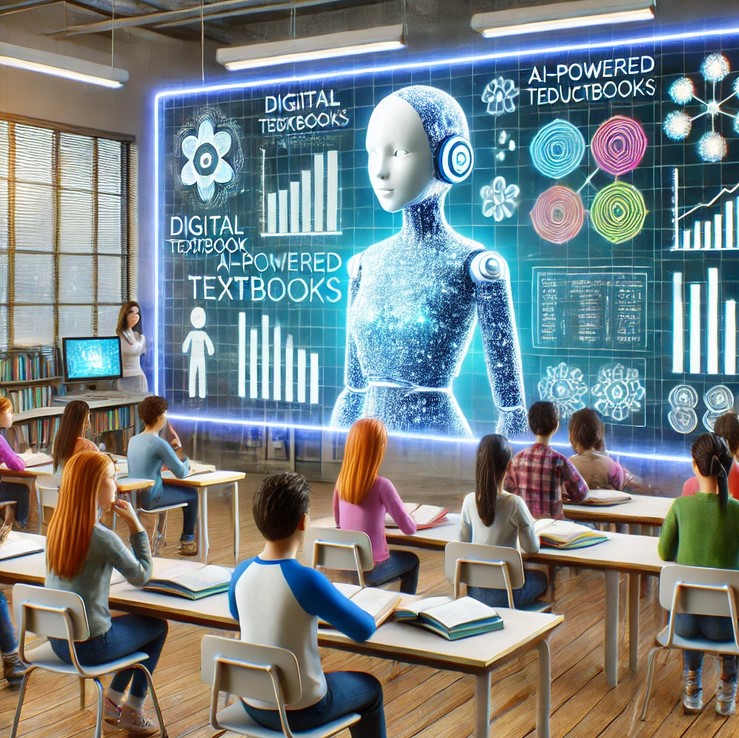TEXTBOOK DISRUPTION
(PSO), (IBM), (CHGG), (LPL), (NVDA), (AMZN)
What if textbooks could read you as well as you read them? That's the promise of AI-powered learning.
But what exactly does this AI-powered future look like?
First, forget those dusty, static tomes of your school days. Instead, get with the times and think of textbooks that learn with you, adjusting their content and pace to match your individual needs.
They'll pinpoint your strengths and weaknesses faster than a Wall Street analyst spotting a market trend, and deliver personalized lessons and feedback in real-time.
These digital marvels will assess a student's grasp of calculus quicker than you can say "derivative," serving up personalized content faster than a short-order cook on amphetamines.
We're talking real-time feedback, custom-tailored lessons, and engagement levels that'll make social media look boring.
For the class dunce, it's extra help. For the whiz kid, it's brain fuel.
Basically, using AI textbooks is like having a tutor that never sleeps, doesn't charge by the hour, and won't judge you for showing up in your pajamas.
And trust me, this isn't some pie-in-the-sky idea that only appeals to educators. In fact, it's already shaping up to be a multi-billion dollar goldmine for sharp-eyed investors.
Let's start with the big picture. The broader education technology (EdTech) market is on track to explode to a mind-boggling $404 billion by 2025.
We're not talking about a gentle uptick here. This is the kind of growth that makes the Gold Rush look like a garage sale.
Zoom in a bit, and you'll see the “AI in Education” market is estimated to grow at a jaw-dropping CAGR of 47% from 2021 to 2027, reaching $3.68 billion by 2023.
And the global textbook market? It's set to hit a cool $20.6 billion by 2026, growing at a steady 3.4% CAGR from 2021.
But here's the kicker: AI-powered textbooks are poised to disrupt this entire industry faster than you can say "digital transformation."
Don't just take my word for it, though. Look at what's already happening in the real world.
Carnegie Learning's MATHia uses AI to make math less painful than a root canal. DreamBox Learning adapts to students faster than a chameleon on a disco floor.
And Duolingo? They're making language learning more addictive than your favorite smartphone game.
Needless to say, AI isn’t just about cool tech toys anymore. It’s also reshaping how we learn.
Studies show these interactive, personalized experiences can boost student engagement by up to 60%.
And it's not just the tech nerds who are excited. A survey by EdWeek Research Center found that 66% of teachers believe AI can personalize learning for students.
When was the last time 66% of teachers agreed on anything?
Meanwhile, venture capitalists, those professional gamblers of the finance world, poured a record $16.1 billion into EdTech in 2020.
That's not just putting your money where your mouth is—it's stuffing your entire wallet down your throat and asking for seconds.
So, who are the players in this educational gold rush? Let's start with the old guard.
Pearson PLC (PSO) is using AI for everything from adaptive learning to automated grading. They’re looking to partner with IBM (IBM) and its Watson AI, creating a brain trust that would make Einstein look like a slack-jawed yokel.
Chegg (CHGG) is another one to watch. It uses AI to solve problems and catch plagiarists quicker than a frat house can empty a keg.
But it's not just the education-specific players making moves.
Tech giants are stepping into the classroom. LG Electronics (LPL) is expanding into the education sector faster than a teenager's excuse for missing homework.
NVIDIA (NVDA) is providing the raw computing power, Amazon (AMZN) is offering the cloud infrastructure, and IBM is bringing its AI expertise to the table.
It's like the Avengers of AI, but instead of saving the world, they're trying to make sure little Timmy finally grasps fractions.
And the future of edtech? It's so bright, you might need to wear shades in the classroom.
We're talking VR field trips to ancient Rome, AI tutors that make Socrates look like a slacker, and learning analytics that can predict academic success better than a helicopter parent.
I know that for some of us, passing notes was high-tech classroom communication. Obviously, everything we know about school has changed since then.
Now, AI is writing the whole textbook. I suggest you start studying this sector now, or risk being left back a grade in the school of profitable opportunities.


